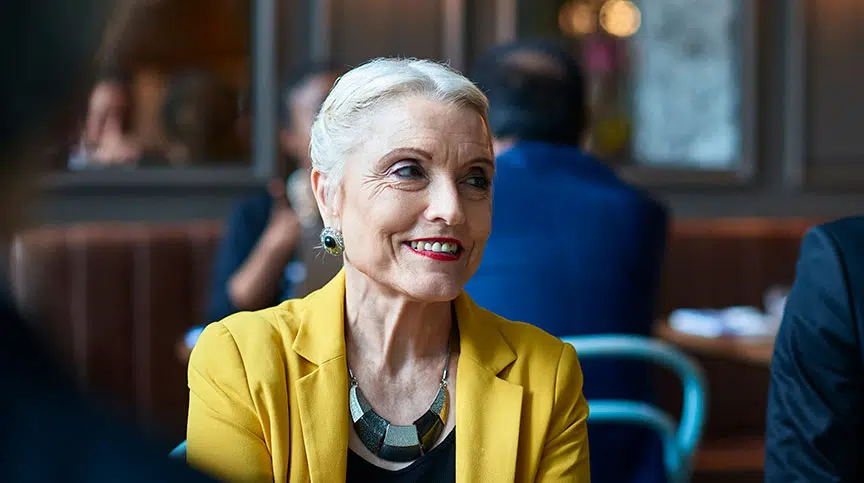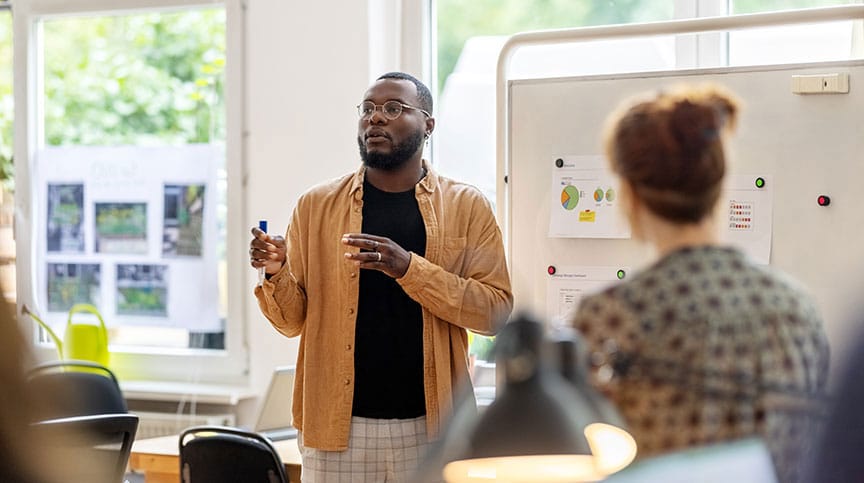Diverse teams are essential for optimal performance and innovation — and the wellbeing of individuals, organizations, and communities.
That’s why it’s important that your organization provide an environment and culture that enables all workers to fulfill the purpose or mission. To do this, leaders must recognize the ways that their employees’ experiences in the workplace can vary widely.
Black professionals have different experiences from their non-Black counterparts that senior organizational leaders may not be aware of, but must take into consideration in their efforts to attract and retain talent and cultivate more equitable, diverse, and inclusive work environments.
We are authoring this piece as 2 Black professionals, members of the Black Professionals Employee Resource Group (ERG) at the Center for Creative Leadership, to share our perspectives and offer tips for organizations and individuals. We recognize that our social identities are unique, and therefore our experiences may both differ from, and overlap with, other Black professionals.
Some Common Barriers We’ve Experienced as Black Professionals
Reflecting on our years of experience and conversations with peers, there are several common barriers that Black professionals face when navigating the workplace and their careers. These barriers often include not feeling psychologically safe at work; experiencing a lack of mentorship and sponsorship opportunities; and undergoing feelings of isolation and exclusion.
While these are certainly not the only barriers that exist for Black professionals in the workplace — and while these challenges are not faced exclusively by Black professionals — they are often experienced more acutely by Black professionals, and can have major implications for career advancement.
Barrier: Not Feeling Psychologically Safe
Psychological safety at work is a shared belief held by members of a team that others on the team will not embarrass, reject, or punish them for speaking up.
When a Black employee is on a team, in a department, or in an organization where they are the only Black person or one of only a few Black people, it can be challenging to feel a true sense of psychological safety and trust.
Even if other members of the team are welcoming and aware of the importance of allyship, it can still be difficult for an individual to open up and be vulnerable enough to offer ideas or suggestions when they don’t see aspects of their identity represented in others.
We’ve experienced and often heard sentiments from peers of “I can’t bring my whole self to work,” and being “unable to relate to the stories being shared by my colleagues that were so familiar to everyone else, because our personal experiences were different.”
This feeling of a lack of psychological safety adds more stress, along with a feeling of “extra work” for Black professionals to find ways to build meaningful relationships that allow us to feel comfortable sharing our ideas.
Barrier: Lack of Mentoring & Sponsoring Opportunities
For some Black professionals in the U.S., being first-generation college students who attended Historically Black Colleges and Universities (HBCUs) is a shared experience. For us, attending an HBCU provided a safe and nurturing environment that celebrated our history and contributions. According to a Gallup poll, Black HBCU graduates are more likely to be thriving in purpose and financial wellbeing than Black graduates who did not receive their degrees from HBCUs.
However, for many, being first-generation college students meant that our parents didn’t have the experience to share the importance of internships that may lead to the first step in a career, or the importance of networking, sponsors, and mentoring at work once we secured that first job.
Many Black professionals were taught about the importance of hard work, being reliable, and following through on commitments. But hard work doesn’t equate to a promotion. In the absence of having someone to advocate on your behalf, we’re often not considered or even aware of future opportunities.
Barrier: Experiencing Feelings of Isolation & Exclusion
Nothing can be more daunting than being one of very few Black professionals who look like you in the room. And the higher you progress in the organization, the more likely it is for that number to decrease to just you.
The mind can sometimes play a terrible trick on you, and cause you to question whether you belong or are worthy to be where you have worked so hard to be. Self-doubt is the seed of impostor syndrome, where you fail to recognize your capabilities even in light of clear evidence to the contrary. It can make you feel isolated and excluded, and can limit your career and personal growth.
Many Black professionals aren’t experiencing a sense of belonging, trust, and respect at work, according to the “Being Black in Corporate America” report by Coqual. The report found that Black professionals encounter microaggressions in the workplace at a significantly higher rate than other racial groups. These microaggressions can further reinforce feelings of “otherness” and exclusion.
One of these microaggressions, “being mistaken for someone else of the same racial background” is an experience that happened to us for years. It got to the point that we would make a joke about being related to one another, just to help us cope with the stress of it happening yet again.
3 Ways Organizations Can Help Remove Barriers for Black Professionals
Our Advice to Organizational Leaders: Create an Environment Where All Workers Can Thrive
Incremental change is not enough to help Black professionals overcome the barriers placed against them. A steep change in action is needed to correct inequitable systems and processes, and it must be driven by employers.
Organizations must acknowledge their part in the solution and take real action to help their Black professionals feel psychologically safe in the workplace, create opportunities through mentorship and sponsorship, and cultivate an environment of inclusion and belonging.
In this section, our recommendations are aimed at organizational leaders who are in positions that allow them to implement changes to better support Black professionals in the workplace.
1. Foster psychological safety.
Trust is the basis of a psychologically safe work environment. Organizations’ willingness to take small steps to increase transparency and build trust will result in a positive climate of innovation and creativity, and a safe space that allows all employees to thrive.
Organizational leaders must acknowledge and embrace that differences exist, and demonstrate care and concern for Black professionals as people. Encourage team leaders to check in with Black employees and actively seek their feedback, as well as provide multiple ways for employees to share their thoughts and ideas. Educate all employees on understanding social identity and recognizing and overcoming unconscious bias.
But it doesn’t stop there. Organizations must be intentional about a no-tolerance policy toward racism and discrimination and hold employees accountable at all levels.
To ensure psychological safety permeates throughout the fabric of an organization, take a systemic approach to workplace culture change. Organizational leaders must regularly review policies and processes — especially those related to hiring and promotion — and conduct culture surveys and diversity audits, using the data to create measurable strategies for improvement.
While sustainable culture change takes intentional planning and effort, you can take a small step in the right direction by trying our week-long psychological safety challenge.
2. Provide mentoring and sponsoring opportunities.
While informal mentorship and sponsorship relationships often exist within an organization, unconscious or conscious bias can result in inequitable opportunities for Black employees to be mentored or sponsored by senior leaders with more experience and influence.
Organizational leaders should make it a priority to ensure Black professionals have access to these critical relationships. Formalize the process by building mentorship and sponsorship goals into performance reviews. It’s especially important for senior leaders to uphold commitments to mentoring and sponsoring Black professionals early in their careers to advocate for them and provide guidance to help them grow and develop.
These professional relationships are beneficial to both parties involved, and the organization as a whole. Reverse mentoring, in which a junior team member mentors a more senior team member, can help support more equitable, diverse, and inclusive cultures by challenging power structures and promoting mutual learning.
Placing rising Black professionals into new opportunities — while providing the appropriate support — is a great way to assess capacity for future leadership roles. Investing in the development of the advancing leaders’ skills and knowledge and connecting them with others who will inspire them to take on new initiatives are great ways to help Black professionals achieve success.
3. Cultivate belonging and inclusion.
Building a more inclusive and equitable workplace must continue to be a top priority for all organizational leaders, despite the fact that inclusive leadership practices can be deceptively difficult to execute successfully. It starts with organizations being committed to addressing this challenge and senior leadership modeling behaviors that promote inclusion and belonging.
Organizations must recognize that their journey to cultivating more equitable, diverse, and inclusive cultures is an ongoing process. They must understand the importance of listening to their employees’ needs, and shifting to address those needs as best they can.
If your organization is not already doing so, provide support for employee resource groups (ERGs), which offer a safe space for individuals with shared social identities or life experiences to congregate, network, and support one another.
You can also show Black professionals — and all employees — that you value their contributions by investing in their personal and professional development by way of leadership programs and courses.
Overcoming Common Barriers as a Black Professional in the Workplace
Our Advice to Fellow Black Professionals
Employers must take concerted efforts to address and remove the unique barriers Black professionals face in the workplace. While the responsibility for change rests on organizations, here are some tips that Black professionals can implement to navigate challenges and advance professionally, while maintaining personal wellbeing.
1. Find sources of psychological safety.
We all want to feel comfortable being our authentic selves at work and feeling open to sharing ideas. One way to increase comfort in this area is by looking for common interests and social identities shared with colleagues, and then building relationships around those intersections.
Are there team members who practice the same religion as you? Share the experience of being an adoptive parent? Identify as LGBTQ? Look for commonalities with colleagues and use them to deepen your connections.
2. Actively seek out mentorship and sponsorship opportunities.
No one knows your capabilities and potential better than you. While it’s important to track your accomplishments and embrace authentic self-promotion at work, it’s also critical to know the difference between a mentor and a sponsor and be proactive in seeking out those relationships.
Mentors provide guidance and support, and sponsors actively work on your behalf to advance your career. As you build your network inside and outside the organization, make note of contacts who might be a good fit for both of these roles, and let them know you would value that type of relationship.
3. Lean into opportunities for fellowship.
Chances are, there will be opportunities within your organization and industry to congregate and connect in ways that don’t directly involve your day-to-day work. By being willing to participate in virtual or in-person social events involving your company’s initiatives or the external market, you can interact with your colleagues without the stress of producing output or a deliverable for your job.
These situations can offer networking opportunities, chances to voice your ideas, and a way to get to know your colleagues away from the direct pressures of the working environment.
Turn Commitments Into Sustainable Progress for Black Professionals
Organizational leaders: remember that before your organization can create systemic change, you must understand the current experiences and future expectations of your employees. The actions your organization takes toward sustainable EDI impact must be based on a data-driven approach which considers multiple inputs — and asking your Black professionals and other groups about their experience working for your company is a great starting point.
It’s always best not to assume you know what others need to succeed, and to have a conversation with them about what support looks like for them.
The importance of organizational accountability in this context cannot be understated. In order for systems to change, corporate statements on your commitment to EDI must include specific actions and measures to hold individuals and the organization accountable for making progress.
So support the Black professionals in your organization by prioritizing change and meeting your words with action.
Ready to Take the Next Step?
Get our latest research, tips, and insights on leadership by signing up for our newsletters.











